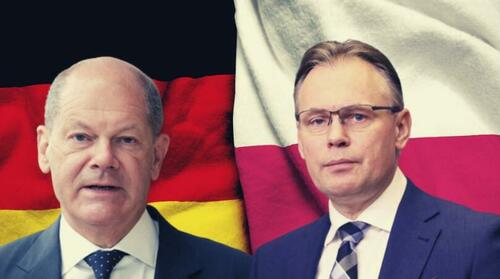(Décidément scholz trouve tous les moyens d'épuiser la cassette qui doit servir à l'Allemagne à se redresser sans utiliser la dette. Je croyais que des accords avait été passés pour que les indemnisations des dommages de guerre ne soient pas mis sur le tapis afin qu'une nouvelle situation pré-nazi ne déclenche un remake de ce qui avait provoqué son émergence et la deuxième guerre mondiale. Aujourd'hui grâce aux efforts de scholz, l'Allemagne est dans la même situation, alors ? note de rené)
Germany's Ruling SPD Party Ready To Talk WWII Reparations With Poland
Authored by Olivier Bault via Remix News,
Germany’s ruling Social Democrats (SPD) are ready to “solve” the issue of war reparations with Poland, according to Arkadiusz Mularczyk, the Polish deputy foreign affairs minister in charge of the issue of war reparations, who spoke to Remix News’ Olivier Bault during a meeting in Warsaw yesterday.
Mularczyk was informed that in the Olaf Scholz-led coalition government, the SPD at least “understands the problem and wants to solve it in some way in a formula of dialogue with Poland.”
Scholz himself belongs to the SPD, and the German party’s agreement that the issue needs to be addressed could mark a major turning point in the ongoing reparations saga. Poland made headlines in 2022 when it estimated Germany owed Poland up to €1.5 trillion due to material and humanitarian losses during the Second World War; however, Germany has dismissed the claims in the past.
During the interview with Mularczyk, which we will soon publish in full regarding the “Report on the Losses Sustained by Poland as a Result of German Aggression and Occupation During the Second World War” and the accompanying demands from Germany for financial compensation estimated at 6.6 trillion zlotys, which equates to €1.4-1.5 trillion euros, Mularczyk said:
“There was a series of meetings with German MPs, in Warsaw, with MPs of the Polish-German friendship group, but also in Berlin, with a number of German parliamentarians. The largest was a meeting at the German Council on Foreign Relations, DGAP, where there was a group of at least a dozen parliamentarians. Recently, I sent a letter to all members of the Bundestag and Bundesrat on this issue, and you will be the first to know that I’ve just received a thank you from the Coordinator of German-Polish Intersocietal and Cross-Border Cooperation at the Federal Foreign Office in the coalition government of Chancellor Olaf Scholz, Dietmar Nietan, writing on behalf of the SPD, that they understand the problem and want to solve it in some way in a formula of dialogue with Poland and also with me.”
Although it is unclear how far the dialogue will go, Germany has stated in the past that the matter of reparations to Poland is “settled.” However, Poland has pressed the issue, using a variety of diplomatic and political means to force Germany to address Poland’s catastrophic losses during the Second World War.
After Germany signaled it would not pay reparations, Mularczyk stated in 2022:
“Now, Germany has a choice: Either it sits down with Poland at the negotiating table, or we will raise the issue in all international forums — in the UN, in the Council of Europe and in the European Union.”
In December 2022, Mularczyk stated that he had appealed to the secretary general of the Council of Europe for assistance with Poland’s reparations claim for damages incurred by Germany during the Second World War. At that time, Mularczyk stated that Germany had so far refused to engage in a discussion about compensation.
In the past, Germany has pointed to the 1953 agreement with Poland’s then communist rulers, who relinquished all reparation demands due to pressure from the Soviet Union, which wanted to free East Germany from liabilities.
However, Poland contends that the agreement is invalid because Poland never received fair compensation and because it was made under duress. Additionally, says Mularczyk, there is no official document or bilateral agreement confirming the Polish communist government’s decision to relinquish all reparation demands, nor was such a decision published in the official bulletin of the Polish People’s Republic at that time.

Aucun commentaire:
Enregistrer un commentaire